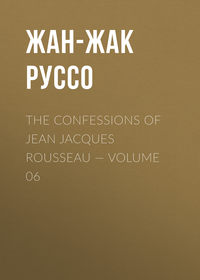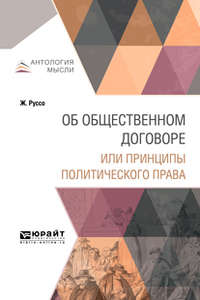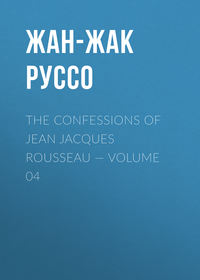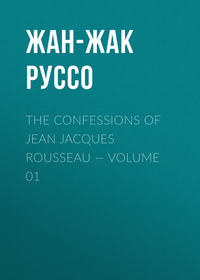 полная версия
полная версияThe Confessions of Jean Jacques Rousseau — Volume 09
All these things considered, I was rather embarrassed as to the form I should give to my work. To suffer the author's visions to pass was doing nothing useful; fully to refute them would have been unpolite, as the care of revising and publishing his manuscripts, which I had accepted, and even requested, had been intrusted to me; this trust had imposed on me the obligation of treating the author honorably. I at length concluded upon that which to me appeared the most decent, judicious, and useful. This was to give separately my own ideas and those of the author, and, for this purpose, to enter into his views, to set them in a new light, to amplify, extend them, and spare nothing which might contribute to present them in all their excellence.
My work therefore was to be composed of two parts absolutely distinct: one, to explain, in the manner I have just mentioned, the different projects of the author; in the other, which was not to appear until the first had had its effect, I should have given my opinion upon these projects, which I confess might sometimes have exposed them to the fate of the sonnet of the misanthrope. At the head of the whole was to have been the life of the author. For this I had collected some good materials, and which I flattered myself I should not spoil in making use of them. I had been a little acquainted with the Abbe de St. Pierre, in his old age, and the veneration I had for his memory warranted to me, upon the whole, that the comte would not be dissatisfied with the manner in which I should have treated his relation.
I made my first essay on the 'Perpetual Peace', the greatest and most elaborate of all the works which composed the collection; and before I abandoned myself to my reflections I had the courage to read everything the abbe had written upon this fine subject, without once suffering myself to be disgusted either by his slowness or his repetitions. The public has seen the extract, on which account I have nothing to say upon the subject. My opinion of it has not been printed, nor do I know that it ever will be; however, it was written at the same time the extract was made. From this I passed to the 'Polysynodie', or Plurality of Councils, a work written under the regent to favor the administration he had chosen, and which caused the Abbe de Saint Pierre to be expelled from the academy, on account of some remarks unfavorable to the preceding administration, and with which the Duchess of Maine and the Cardinal de Polignac were displeased. I completed this work as I did the former, with an extract and remarks; but I stopped here without intending to continue the undertaking which I ought never to have begun.
The reflection which induced me to give it up naturally presents itself, and it was astonishing I had not made it sooner.
Most of the writings of the Abbe de Saint Pierre were either observations, or contained observations, on some parts of the government of France, and several of these were of so free a nature, that it was happy for him he had made them with impunity. But in the offices of all the ministers of state the Abbe de St. Pierre had ever been considered as a kind of preacher rather than a real politician, and he was suffered to say what he pleased, because it appeared that nobody listened to him. Had I procured him readers the case would have been different. He was a Frenchman, and I was not one; and by repeating his censures, although in his own name, I exposed myself to be asked, rather rudely, but without injustice, what it was with which I meddled. Happily before I proceeded any further, I perceived the hold I was about to give the government against me, and I immediately withdrew. I knew that, living alone in the midst of men more powerful than myself, I never could by any means whatever be sheltered from the injury they chose to do me. There was but one thing which depended upon my own efforts: this was, to observe such a line of conduct that whenever they chose to make me feel the weight of authority they could not do it without being unjust. The maxim which induced me to decline proceeding with the works of the Abbe de Saint Pierre, has frequently made me give up projects I had much more at heart. People who are always ready to construe adversity into a crime, would be much surprised were they to know the pains I have taken, that during my misfortunes it might never with truth be said of me, Thou hast deserved them.
After having given up the manuscript, I remained some time without determining upon the work which should succeed it, and this interval of inactivity was destructive; by permitting me to turn my reflections on myself, for want of another object to engage my attention. I had no project for the future which could amuse my imagination. It was not even possible to form any, as my situation was precisely that in which all my desires were united. I had not another to conceive, and yet there was a void in my heart. This state was the more cruel, as I saw no other that was to be preferred to it. I had fixed my most tender affections upon a person who made me a return of her own. I lived with her without constraint, and, so to speak, at discretion. Notwithstanding this, a secret grief of mind never quitted me for a moment, either when she was present or absent. In possessing Theresa, I still perceived she wanted something to her happiness; and the sole idea of my not being everything to her had such an effect upon my mind that she was next to nothing to me.
I had friends of both sexes, to whom I was attached by the purest friendship and most perfect esteem; I depended upon a real return on their part, and a doubt of their sincerity never entered my mind; yet this friendship was more tormenting than agreeable to me, by their obstinate perseverance and even by their affectation, in opposing my taste, inclinations and manner of living; and this to such a degree, that the moment I seemed to desire a thing which interested myself only, and depended not upon them, they immediately joined their efforts to oblige me to renounce it. This continued desire to control me in all my wishes, the more unjust, as I did not so much as make myself acquainted with theirs, became so cruelly oppressive, that I never received one of their letters without feeling a certain terror as I opened it, and which was but too well justified by the contents. I thought being treated like a child by persons younger than myself, and who, of themselves, stood in great need of the advice they so prodigally bestowed on me, was too much: "Love me," said I to them, "as I love you, but, in every other respect, let my affairs be as indifferent to you, as yours are to me: this is all I ask." If they granted me one of these two requests, it was not the latter.
I had a retired residence in a charming solitude, was master of my own house, and could live in it in the manner I thought proper, without being controlled by any person. This habitation imposed on me duties agreeable to discharge, but which were indispensable. My liberty was precarious. In a greater state of subjection than a person at the command of another, it was my duty to be so by inclination. When I arose in the morning, I never could say to myself, I will employ this day as I think proper. And, moreover, besides my being subject to obey the call of Madam d'Epinay, I was exposed to the still more disagreeable importunities of the public and chance comers. The distance I was at from Paris did not prevent crowds of idlers, not knowing how to spend their time, from daily breaking in upon me, and, without the least scruple, freely disposing of mine. When I least expected visitors I was unmercifully assailed by them, and I seldom made a plan for the agreeable employment of the day that was not counteracted by the arrival of some stranger.
In short, finding no real enjoyment in the midst of the pleasures I had been most desirous to obtain, I, by sudden mental transitions, returned in imagination to the serene days of my youth, and sometimes exclaimed with a sigh: "Ah! this is not Les Charmettes!"
The recollection of the different periods of my life led me to reflect upon that at which I was arrived, and I found I was already on the decline, a prey to painful disorders, and imagined I was approaching the end of my days without having, tasted, in all its plentitude, scarcely anyone of the pleasures after which my heart had so much thirsted, or having given scope to the lively sentiments I felt it had in reserve. I had not favored even that intoxicating voluptuousness with which my mind was richly stored, and which, for want of an object, was always compressed, an never exhaled but by signs.
How was it possible that, with a mind naturally expansive, I, with whom to live was to love, should not hitherto have found a friend entirely devoted to me; a real friend: I who felt myself so capable of being such a friend to another? How can it be accounted for that with such warm affections, such combustible senses, and a heart wholly made up of love, I had not once, at least, felt its flame for a determinate object? Tormented by the want of loving, without ever having been able to satisfy it, I perceived myself approaching the eve of old age, and hastening on to death without having lived.
These melancholy but affecting recollections led me to others, which, although accompanied with regret, were not wholly unsatisfactory. I thought something I had not yet received was still due to me from destiny.
To what end was I born with exquisite faculties? To suffer them to remain unemployed? the sentiment of conscious merit, which made me consider myself as suffering injustice, was some kind of reparation, and caused me to shed tears which with pleasure I suffered to flow.
These were my mediations during the finest season of the year, in the month of June, in cool shades, to the songs of the nightingale, and the warbling of brooks. Everything concurred in plunging me into that too seducing state of indolence for which I was born, and from which my austere manner, proceeding from a long effervescence, should forever have delivered me. I unfortunately remembered the dinner of the Chateau de Toune, and my meeting with the two charming girls in the same season, in places much resembling that in which I then was. The remembrance of these circumstances, which the innocence that accompanied them rendered to me still more dear, brought several others of the nature to my recollection. I presently saw myself surrounded by all the objects which, in my youth, had given me emotion. Mademoiselle Galley, Mademoiselle de Graffenried, Mademoiselle de Breil, Madam Basile, Madam de Larnage, my pretty scholars, and even the bewitching Zulietta, whom my heart could not forget. I found myself in the midst of a seraglio of houris of my old acquaintance, for whom the most lively inclination was not new to me. My blood became inflamed, my head turned, notwithstanding my hair was almost gray, and the grave citizen of Geneva, the austere Jean Jacques, at forty-five years of age, again became the fond shepherd. The intoxication, with which my mind was seized, although sudden and extravagant, was so strong and lasting, that, to enable me to recover from it, nothing less than the unforeseen and terrible crisis it brought on was necessary.
This intoxication, to whatever degree it was carried, went not so far as to make me forget my age and situation, to flatter me that I could still inspire love, nor to make me attempt to communicate the devouring flame by which ever since my youth I had felt my heart in vain consumed. For this I did not hope; I did not even desire it. I knew the season of love was past; I knew too well in what contempt the ridiculous pretensions of superannuated gallants were held, ever to add one to the number, and I was not a man to become an impudent coxcomb in the decline of life, after having been so little such during the flower of my age. Besides, as a friend to peace, I should have been apprehensive of domestic dissensions; and I too sincerely loved Theresa to expose her to the mortification of seeing me entertain for others more lively sentiments than those with which she inspired me for herself.
What step did I take upon this occasion? My reader will already have guessed it, if he has taken the trouble to pay the least attention to my narrative. The impossibility of attaining real beings threw me into the regions of chimera, and seeing nothing in existence worthy of my delirium, I sought food for it in the ideal world, which my imagination quickly peopled with beings after my own heart. This resource never came more apropos, nor was it ever so fertile. In my continual ecstasy I intoxicated my mind with the most delicious sentiments that ever entered the heart of man. Entirely forgetting the human species, I formed to myself societies of perfect beings, whose virtues were as celestial as their beauty, tender and faithful friends, such as I never found here below. I became so fond of soaring in the empyrean, in the midst of the charming objects with which I was surrounded, that I thus passed hours and days without perceiving it; and, losing the remembrance of all other things, I scarcely had eaten a morsel in haste before I was impatient to make my escape and run to regain my groves. When ready to depart for the enchanted world, I saw arrive wretched mortals who came to detain me upon earth, I could neither conceal nor moderate my vexation; and no longer master of myself, I gave them so uncivil a reception, that it might justly be termed brutal. This tended to confirm my reputation as a misanthrope, from the very cause which, could the world have read my heart, should have acquired me one of a nature directly opposite.
In the midst of my exultation I was pulled down like a paper kite, and restored to my proper place by means of a smart attack of my disorder. I recurred to the only means that had before given me relief, and thus made a truce with my angelic amours; for besides that it seldom happens that a man is amorous when he suffers, my imagination, which is animated in the country and beneath the shade of trees, languishes and becomes extinguished in a chamber, and under the joists of a ceiling. I frequently regretted that there existed no dryads; it would certainly have been amongst these that I should have fixed my attachment.
Other domestic broils came at the same time to increase my chagrin. Madam le Vasseur, while making me the finest compliments in the world, alienated from me her daughter as much as she possibly could. I received letters from my late neighborhood, informing me that the good old lady had secretly contracted several debts in the name of Theresa, to whom these became known, but of which she had never mentioned to me a word. The debts to be paid hurt me much less than the secret that had been made of them. How could she, for whom I had never had a secret, have one from me? Is it possible to dissimulate with persons whom we love? The 'Coterie Holbachique', who found I never made a journey to Paris, began seriously to be afraid I was happy and satisfied in the country, and madman enough to reside there.
Hence the cabals by which attempts were made to recall me indirectly to the city. Diderot, who did not immediately wish to show himself, began by detaching from me De Leyre, whom I had brought acquainted with him, and who received and transmitted to me the impressions Diderot chose to give without suspecting to what end they were directed.
Everything seemed to concur in withdrawing me from my charming and mad reverie. I was not recovered from the late attack I had when I received the copy of the poem on the destruction of Lisbon, which I imagined to be sent by the author. This made it necessary I should write to him and speak of his composition. I did so, and my letter was a long time afterwards printed without my consent, as I shall hereafter have occasion to remark.
Struck by seeing this poor man overwhelmed, if I may so speak, with prosperity and honor, bitterly exclaiming against the miseries of this life, and finding everything to be wrong, I formed the mad project of making him turn his attention to himself, and of proving to him that everything was right. Voltaire, while he appeared to believe in God, never really believed in anything but the devil; since his pretended deity is a malicious being, who, according to him, had no pleasure but in evil. The glaring absurdity of this doctrine is particularly disgusting from a man enjoying the greatest prosperity; who, from the bosom of happiness, endeavors, by the frightful and cruel image of all the calamities from which he is exempt, to reduce his fellow creatures to despair. I, who had a better right than he to calculate and weigh all the evils of human life, impartially examine them, and proved to him that of all possible evils there was not one to be attributed to Providence, and which had not its source rather in the abusive use man made of his faculties than in nature. I treated him, in this letter, with the greatest respect and delicacy possible. Yet, knowing his self-love to be extremely irritable, I did not send the letter immediately to himself, but to Doctor Tronchin, his physician and friend, with full power either to give it him or destroy it. Voltaire informed me in a few lines that being ill, having likewise the care of a sick person, he postponed his answer until some future day, and said not a word on the subject. Tronchin, when he sent me the letter, inclosed in it another, in which he expressed but very little esteem for the person from whom he received it.
I have never published, nor even shown, either of these two letters, not liking to make a parade of such little triumphs; but the originals are in my collections. Since that time Voltaire has published the answer he promised me, but which I never received. This is the novel of 'Candide', of which I cannot speak because I have not read it.
All these interruptions ought to have cured me of my fantastic amours, and they were perhaps the means offered me by Heaven to prevent their destructive consequences; but my evil genius prevailed, and I had scarcely begun to go out before my heart, my head, and my feet returned to the same paths. I say the same in certain respects; for my ideas, rather less exalted, remained this time upon earth, but yet were busied in making so exquisite a choice of all that was to be found there amiable of every kind, that it was not much less chimerical than the imaginary world I had abandoned.
I figured to myself love and friendship, the two idols of my heart, under the most ravishing images. I amused myself in adorning them with all the charms of the sex I had always adored. I imagined two female friends rather than two of my own sex, because, although the example be more rare, it is also more amiable. I endowed them with different characters, but analogous to their connection, with two faces, not perfectly beautiful, but according to my taste, and animated with benevolence and sensibility. I made one brown and the other fair, one lively and the other languishing, one wise and the other weak, but of so amiable a weakness that it seemed to add a charm to virtue. I gave to one of the two a lover, of whom the other was the tender friend, and even something more, but I did not admit either rivalry, quarrels, or jealousy: because every painful sentiment is painful for me to imagine, and I was unwilling to tarnish this delightful picture by anything which was degrading to nature. Smitten with my two charming models, I drew my own portrait in the lover and the friend, as much as it was possible to do it; but I made him young and amiable, giving him, at the same time, the virtues and the defects which I felt in myself.
That I might place my characters in a residence proper for them, I successively passed in review the most beautiful places I had seen in my travels. But I found no grove sufficiently delightful, no landscape that pleased me. The valleys of Thessaly would have satisfied me had I but once had a sight of them; but my imagination, fatigued with invention, wished for some real place which might serve it as a point to rest upon, and create in me an illusion with respect to the real existence of the inhabitants I intended to place there. I thought a good while upon the Boromean Islands, the delightful prospect of which had transported me, but I found in them too much art and ornament for my lovers. I however wanted a lake, and I concluded by making choice of that about which my heart has never ceased to wander. I fixed myself upon that part of the banks of this lake where my wishes have long since placed my residence in the imaginary happiness to which fate has confined me. The native place of my poor mamma had still for me a charm. The contrast of the situations, the richness and variety of the sites, the magnificence, the majesty of the whole, which ravishes the senses, affects, the heart, and elevates the mind, determined me to give it the preference, and I placed my young pupils at Vervey. This is what I imagined at the first sketch; the rest was not added until afterwards.
I for a long time confined myself to this vague plan, because it was sufficient to fill my imagination with agreeable objects, and my heart with sentiments in which it delighted. These fictions, by frequently presenting themselves, at length gained a consistence, and took in my mind a determined form. I then had an inclination to express upon paper some of the situations fancy presented to me, and, recollecting everything I had felt during my youth, thus, in some measure, gave an object to that desire of loving, which I had never been able to satisfy, and by which I felt myself consumed.
I first wrote a few incoherent letters, and when I afterwards wished to give them connection, I frequently found a difficulty in doing it. What is scarcely credible, although most strictly true, is my having written the first two parts almost wholly in this manner, without having any plan formed, and not foreseeing I should one day be tempted to make it a regular work. For this reason the two parts afterwards formed of materials not prepared for the place in which they are disposed, are full of unmeaning expressions not found in the others.
In the midst of my reveries I had a visit from Madam d'Houdetot, the first she had ever made me, but which unfortunately was not the last, as will hereafter appear. The Comtesse d'Houdetot was the daughter of the late M. de Bellegarde, a farmer-general, sister to M. d'Epinay, and Messieurs de Lalive and De la Briche, both of whom have since been introductors to ambassadors. I have spoken of the acquaintance I made with her before she was married: since that event I had not seen her, except at the fetes at La Chevrette, with Madam d'Epinay, her sister-in-law. Having frequently passed several days with her, both at La Chevrette and Epinay, I always thought her amiable, and that she seemed to be my well-wisher. She was fond of walking with me; we were both good walkers, and the conversation between us was inexhaustible. However, I never went to see her in Paris, although she had several times requested and solicited me to do it. Her connections with M. de St. Lambert, with whom I began to be intimate, rendered her more interesting to me, and it was to bring me some account of that friend who was, I believe, then at Mahon, that she came to see me at the Hermitage.
This visit had something of the appearance of the beginning of a romance. She lost her way. Her coachman, quitting the road, which turned to the right, attempted to cross straight over from the mill of Clairvaux to the Hermitage: her carriage stuck in a quagmire in the bottom of the valley, and she got out and walked the rest of the road. Her delicate shoes were soon worn through; she sunk into the dirt, her servants had the greatest difficulty in extricating her, and she at length arrived at the Hermitage in boots, making the place resound with her laughter, in which I most heartily joined. She had to change everything. Theresa provided her with what was necessary, and I prevailed upon her to forget her dignity and partake of a rustic collation, with which she seemed highly satisfied. It was late, and her stay was short; but the interview was so mirthful that it pleased her, and she seemed disposed to return. She did not however put this project into execution until the next year: but, alas! the delay was not favorable to me in anything.











